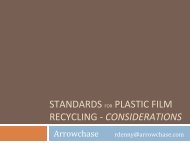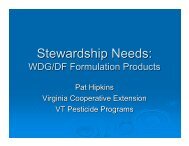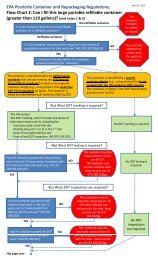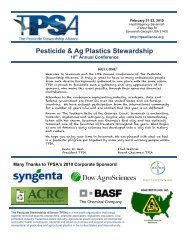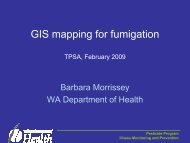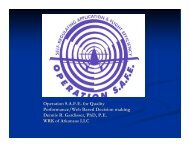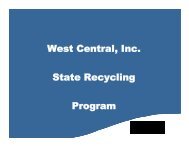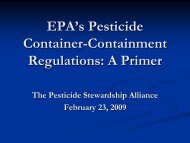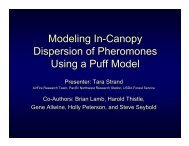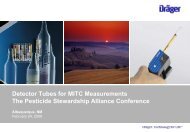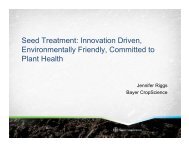Clean Sweep Programs - US Environmental Protection Agency
Clean Sweep Programs - US Environmental Protection Agency
Clean Sweep Programs - US Environmental Protection Agency
- No tags were found...
Create successful ePaper yourself
Turn your PDF publications into a flip-book with our unique Google optimized e-Paper software.
Summary of Kansas Waste Pesticide Disposal ProgramHistorically the Kansas Department of Health and Environment (KDHE) dealt with the problem ofpesticide disposal through a grant program to counties established by the 1995 Legislature. Although thegrant program saw success in some areas, it was not utilized statewide for a variety of reasons. Significanttime and planning are required to conduct and organize pesticide collections. Because of theunpredictability of volumes received at these collections, budgeting for a collection at the county level isoften difficult. The grant program also required a 25% match which some counties found hard to meet. Inorder to overcome some of these problems, the Kansas Agricultural <strong>Clean</strong> <strong>Sweep</strong> program was launched inthe spring of 2000.The <strong>Clean</strong> <strong>Sweep</strong> program is a waste pesticide collection program sponsored entirely by KDHEwith technical assistance supplied by the Kansas Department of Agriculture (KDA). The funding -$150,000 per year - comes from solid waste tipping fees. No matching funds are required from counties orparticipants. The goal of the program is to remove unwanted pesticides from Kansas farms and ranches.Any pesticide, herbicide, fungicide, or rodenticide is accepted by the program. All farmers or ranchersoperating in Kansas are eligible for the program. Pesticide dealers, manufacturers and distributers areeligible to participate on a COD fee basis. Three single day collections are held over a week periodtargeting geographic areas in Kansas. In order to provide adequate personnel and equipment at eachcollection site, all participants are asked to pre-register.<strong>Clean</strong> Harbors <strong>Environmental</strong> Services was selected as contractor for the project through the Statecompetitive bidding process. <strong>Clean</strong> Harbors supplies all on-site labor, equipment, and supplies necessary torun the event. KDHE with assistance from KDA handles all advertising, site selection, project coordination,and public education. Collection sites are located in areas with convenient access and ample hard surfaceroom such as county yards, noxious weed offices, or county fairgrounds.In order to publicize the events, KDHE developed a poster and brochure designed to be used withcollection events statewide. The poster and brochure provides details on the program, a 1-800 numberwhich could be used to request information and for pre-registration, and space for individual customizationsuch as site location, collection dates, and times. Brochures are tri-folded and pre-printed for direct mailing.Posters, brochures, and informational material were distributed across the target areas throughcounty commissions, noxious weed offices, conservation services, extension agencies, Farm Bureau offices,and federal Farm Service Agencies. In addition to poster and brochure distribution, information on theprogram, including collection dates and times, were sent to every radio and TV station and newspaper in thearea. Several radio and newspaper interviews were conducted by KDHE staff. Brochures were also sentto every certified private pesticide applicator in the region using mailing lists supplied by KDA.Kansas held 17 collection events in 2000, collecting a total of 134,106 pounds from 287 participants.Numerous types of pesticides were collected. Some of the more common ones included furadan,heptachlor, toxaphene, atrazine, chlordane, 2,4-D, pentachlorophenol, DDT, and 2,4,5-T. Ten cylinders ofcompressed gas (grain fumigants) were also received. All material received was manifested as hazardouswaste and shipped carrying appropriate waste codes. The program is expected to expand in FY01. Theexpenses in FY2000 were $52,000 for disposal, $3,500 for posters and flyers, and $1,500 for mailings.



